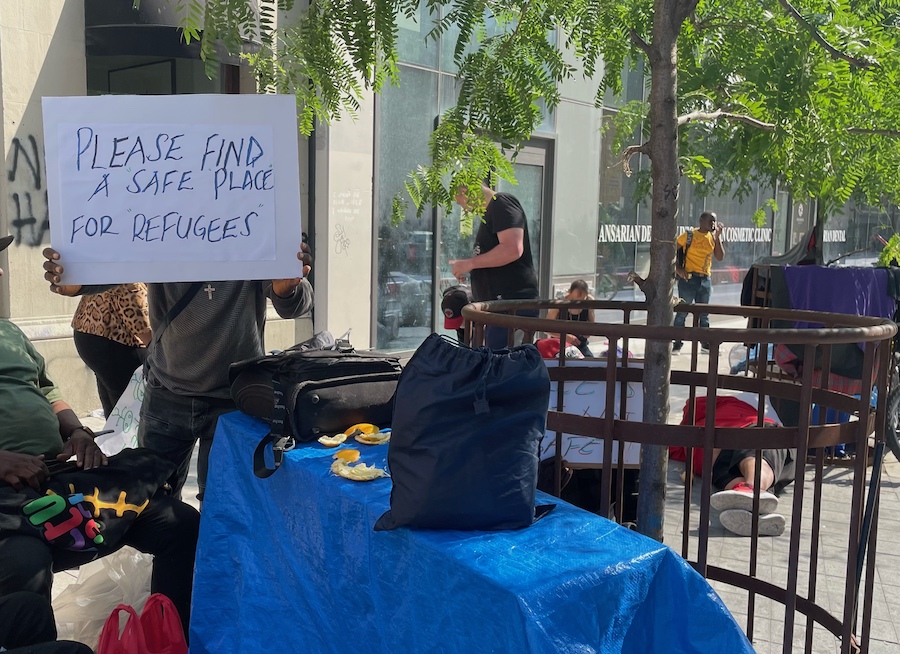On July 18, the federal government committed $97 million in housing funding to Toronto following outreach workers and residents’ advocacy for more than 200 refugees awaiting housing as they slept on the street in downtown Toronto. Torontonians provided food and other supplies while community leaders and churches worked together to relocate the refugees to two North York churches for shelter.
One of the community efforts was a GoFundMe campaign that has raised more than $80,000 to date. Broadview spoke to Lorraine Lam, a Toronto-based outreach worker who helped create the GoFundMe campaign.
Sherlyn Assam: How can the federal government’s commitments and the GoFundMe you co-created help transition people out of this emergency for the time being?
Lorraine Lam: A number of refugee-centered [organizations] have put an ask for $157 million and the feds only offered $97 [million], which is really only going to accommodate the emergency shelters. It’s not going to be enough. It’s really important to recognize that the $16 million that they’re not offering would have paid for more beds in the Toronto shelter system. Overall as a larger system, we know that there’s not enough beds. Yes, $97 [million] is a small win, but it’s not enough.
SA: What community efforts led to this refugee housing crisis garnering enough attention for the federal government to help?
LL: Mutual aid has been around for a long time. A lot more of this mutual aid got a bit more public attention, especially during COVID. There were a lot of groups doing encampment support and a lot of grassroots organizing. There were the community fridges and those still exist. There are a number of groups that have been involved with mutual aid because we recognize the policies and governments have failed. That said, mutual aid is not the solution to systemic issues. This GoFundMe was wildly successful – and I use that loosely – in that we raised way more money than we thought we would, but we have a housing crisis on our hands. This GoFundMe is not building housing.
SA: How can people show up to support people that are facing houselessness?
LL: A really important piece is partnering and supporting what people are actually asking for. For aid to be helpful, they need to actually be speaking with people on the ground, working in a spirit of collaboration. This GoFundMe for instance: we need supplies and we need you to vote a certain way, vote differently. Hold your politicians accountable, lobby, all of those things. The nature of trying to make changes is really political. We can get stuck in giving stuff and we need to focus on the other pieces around changing structures.
SA: Do you think successful future government commitments for housing for people migrating to Canada is a matter of enough affordable housing or having more shelters?
LL: I think yes to both things. Shelters are meant to be a temporary emergency stop. Those have to be in place, no matter what. People, whatever status they are, will land on times where they might need to rely on a shelter. I think the issue right now is that shelters are so beyond capacity because we haven’t addressed the bigger issue which is about housing. We often talk about “there’s not enough housing” but the fact is there are actually a lot of vacant units but they’re not affordable. What we need to do right now is look at the ways that we create affordable housing immediately, including land expropriation. I also think this narrative [of] “we need to make sure there’s housing first before we bring other people in” actually pits groups against each other. It doesn’t recognize the fact that we actually have an abundance of housing now – except that it’s impossible to afford. I think I’ve seen that narrative float around a lot and I think that’s deeply, deeply, deeply problematic and xenophobic. It’s actually not addressing the fact that it’s actually various decision-makers and people in power actually actively withholding resources from all groups of people.
More on Broadview:
- The true cost of food: High grocery prices are not the root issue
- New immigrants could be hit harder by Meta cutting off access to Canadian news
- How changes to the Canada, U.S. Safe Third Country Agreement are putting refugees at risk
SA: What are the short-term and long-term needs to support both refugees and the people working in shelters to provide for them?
LL: The short-term need is shelter spaces so that people are not sweltering outside. There are certain supplies as well. I have one guy that’s like, “Hey, I really need safety boots so I can try to get some work.” It’s the very immediate day-to-day stuff. Long term really is about affordable housing and wraparound supports. Until we can move people into dignified, affordable housing, we’re gonna end up in a situation where we’re gonna be spinning our wheels because people have nowhere to go.
***
This interview has been edited for length and clarity.
Sherlyn Assam is Broadview’s assistant digital editor.















